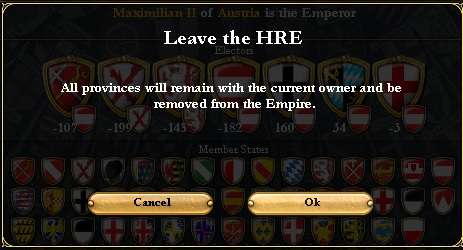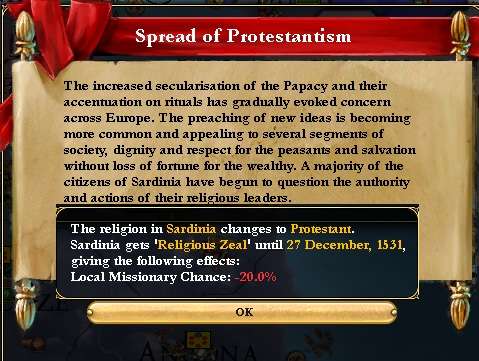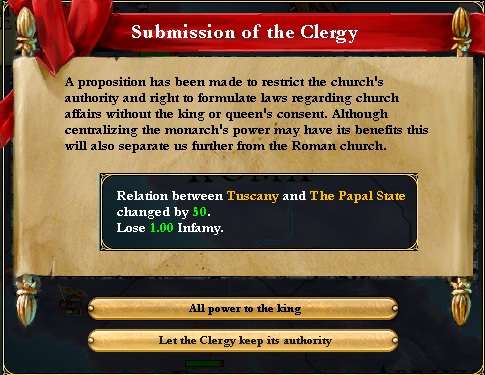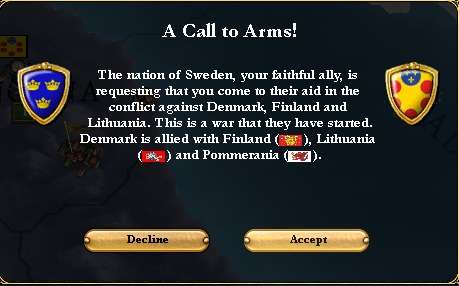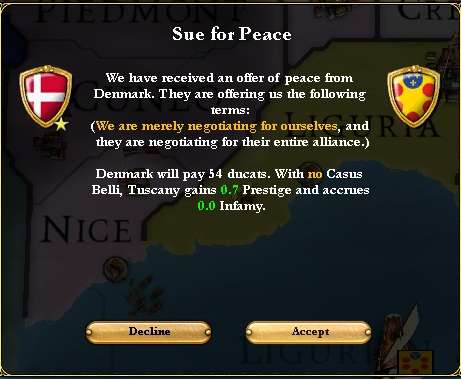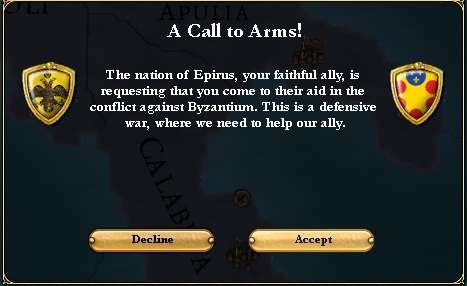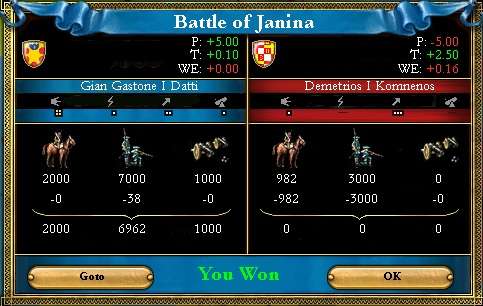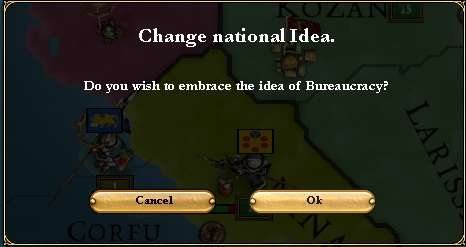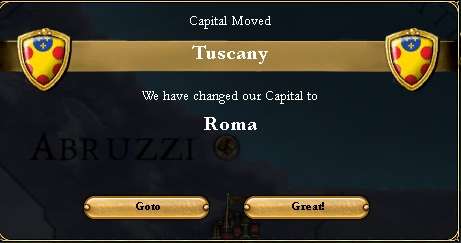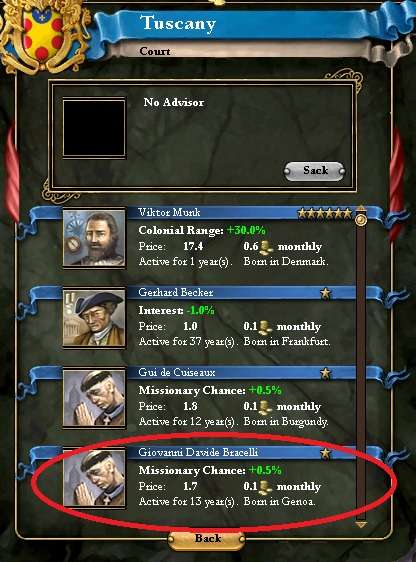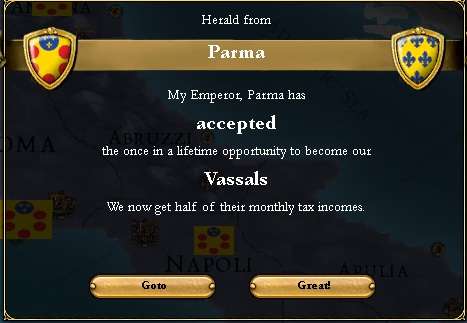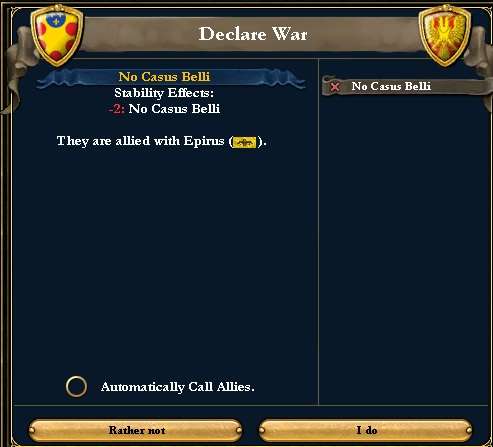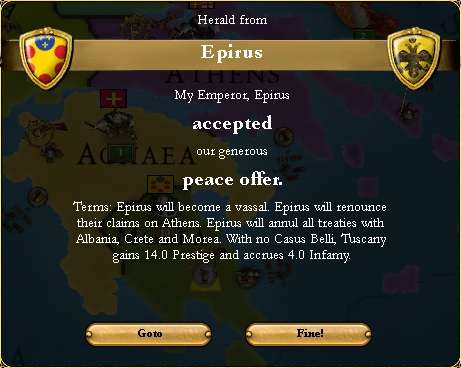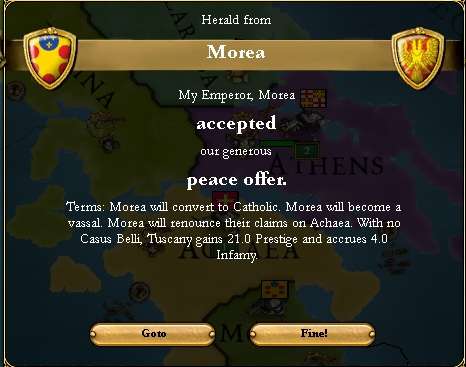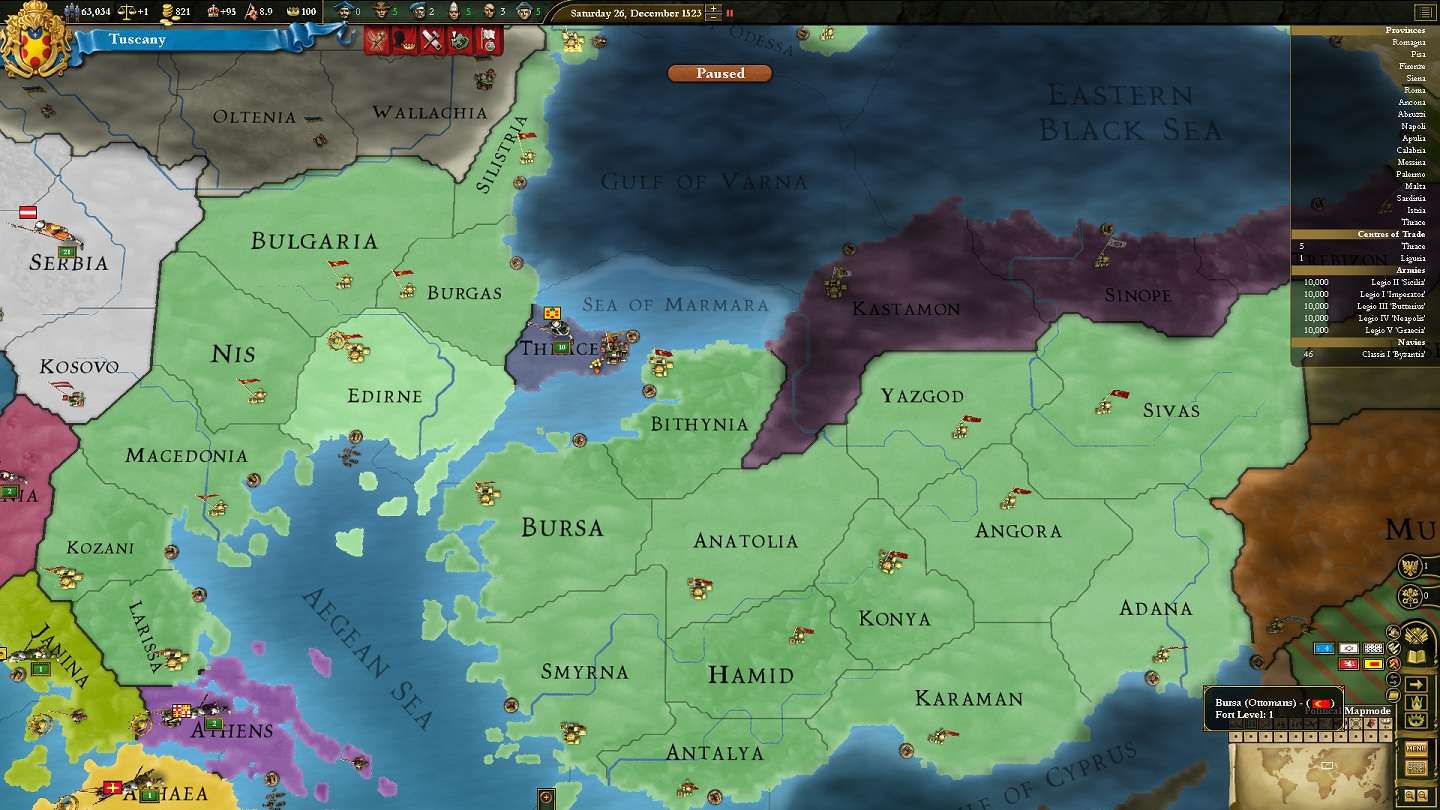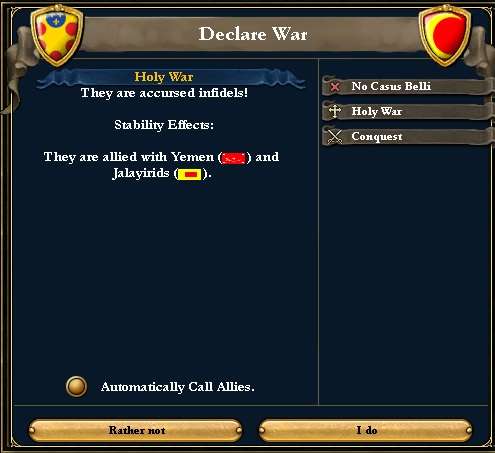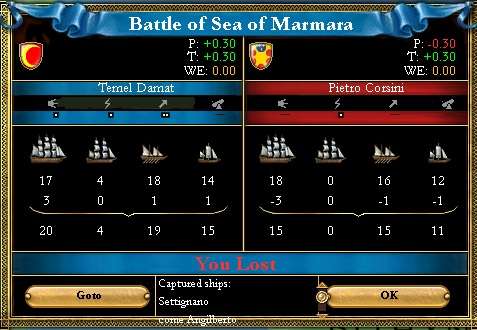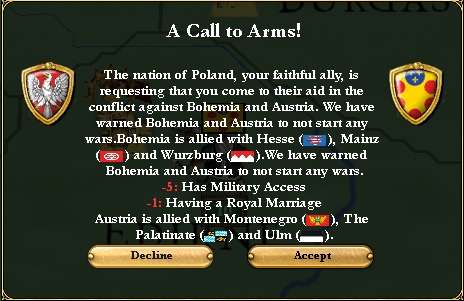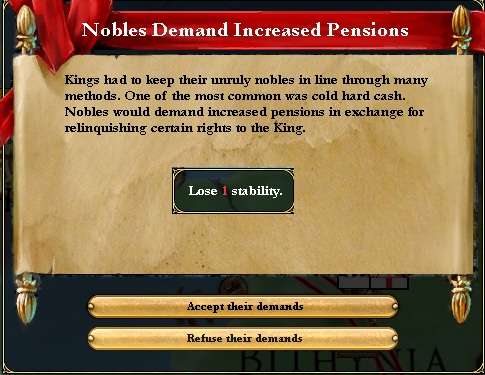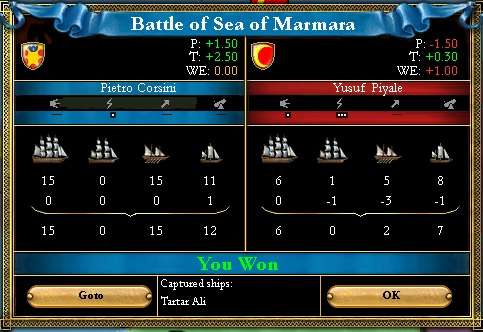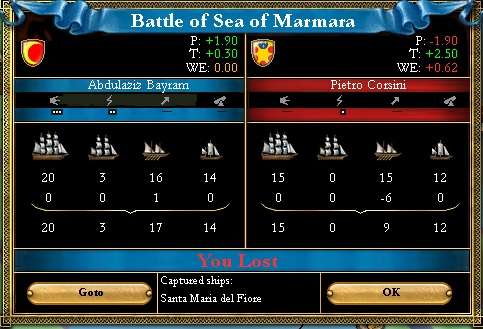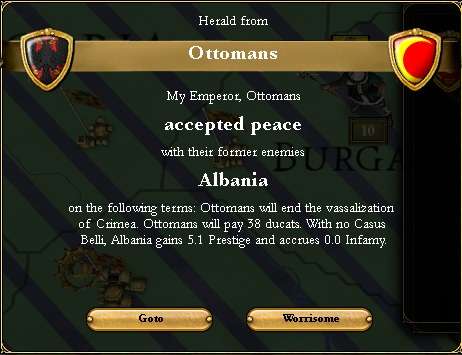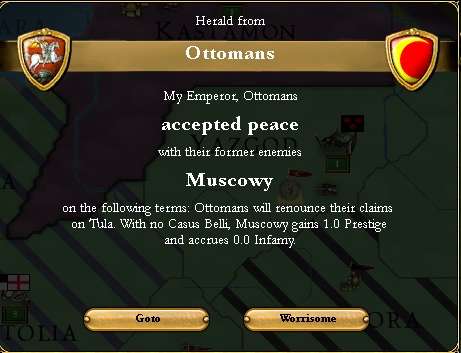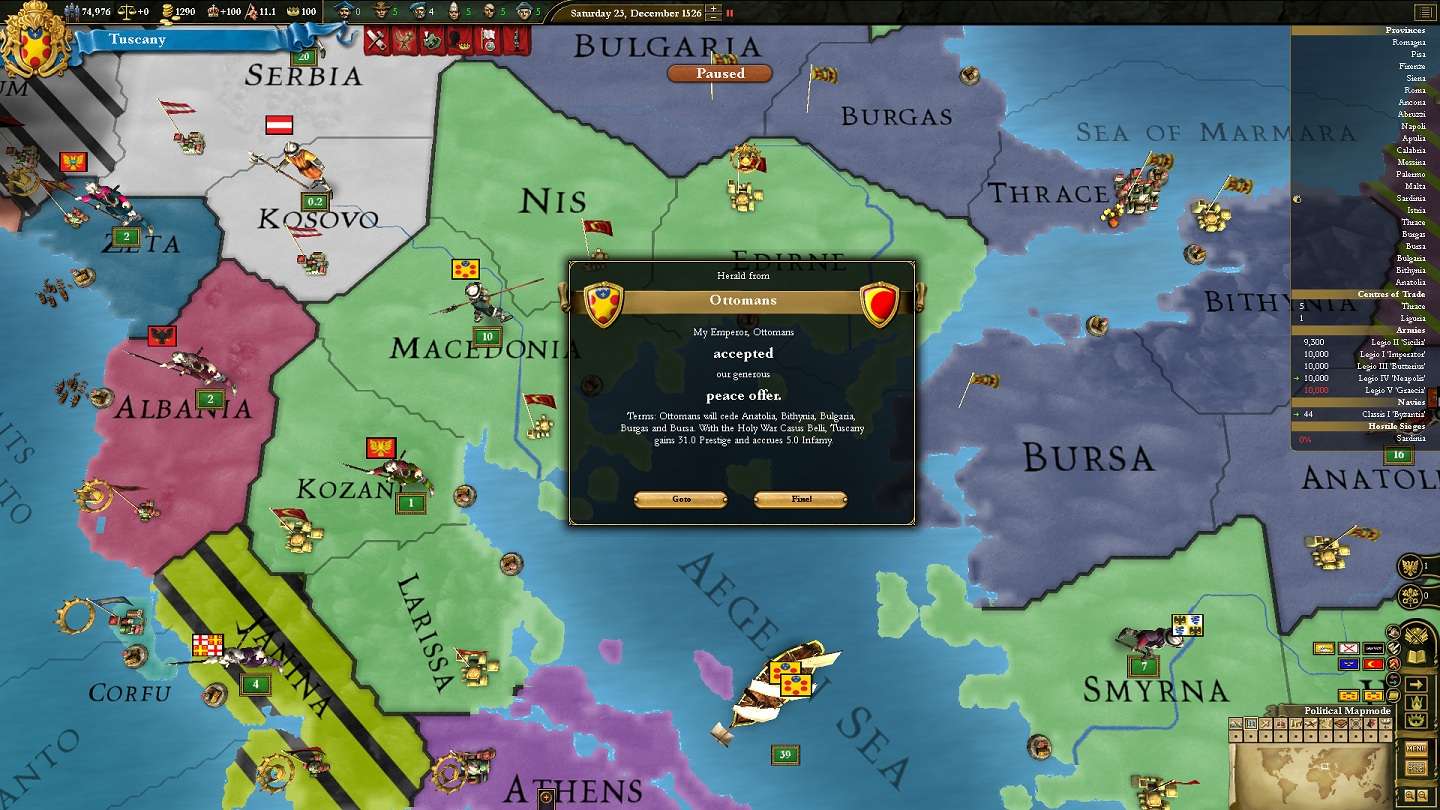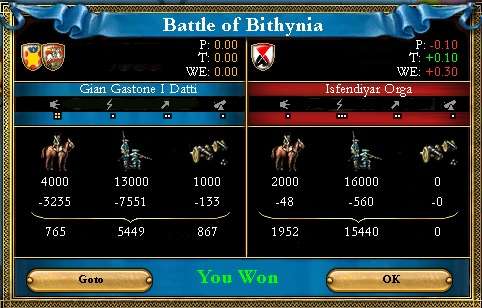Chapter 17: Adventures in diplomacy
14 September 1506, the Senate Chamber
Since the Second Great Italian War had ended, the Empire of Tuscany had been very quiet. Today was not one of those days, however, for the debate on the Emperor's newest policy was lively and spread throughout the Empire, not just the Senate. John I, Emperor of Tuscany and King of Milan, had proposed officially abandoning the Holy Roman Empire (nobody dared call it the Damned German Empire at this point). Of the ten Senators, two were fervently in favor of the decision -- Foreign Minister Pietro Bizzelli and the Duke of Pisa and Siena, Sextus Porcius Cato. Bizzelli knew that such an accomplishment would be a glorious achievement for his family; Sextus, on the other hand, believed that Austria had for too long restricted Tuscany's freedom of action.
The opposition was led by the German from Mecklenburg, Andreas Germanicus, Duke of Milan. He rejected the proposal because he worried about other foreign powers; the might of Austria probably kept some of the more enthusiastic countries like France or Great Britain from paying attention to the Italian peninsula. His popularity throughout the Empire gave him a firm following; Agrippa Tullius Cicero, the Duke of Ancona and Romagna and the Duke of Sicily and Malta, Marshal of the Empire Alex del Moro supported him.
That made the vote 3-2 against. Emperor John could only vote in the case of a tie, according to the Constitution. Prince Rodolfo, the Duke of Rome and Heir to the Throne, did not have his mind on politics; his wife had given birth to a beautiful baby boy, whom he named Leopoldo in honor of the former Emperor. Born in 1502, he was an unremarkable lad. With Rodolfo's personal vitality and vigor, few expected great things of him, although it was a bit worrisome that the Emperor had been unable to produce an heir. He'd developed a taste for army life and was rarely in the capital, unless something truly important was necessary.
As Emperor, John I convened the session of the Senate, as was his right.
"Senators and Nobles of the Empire, I greet you. We have a difficult decision to make today. Do we, or do we not, leave the Holy Roman Empire?"
A copy of the Emperor's proposal
"Foreign Minister Bizzelli, the floor is yours, as champion of this policy. We will then hear from Duke Germanicus, who will provide a rebuttal, and then the rest of you may voice your concerns."
Foreign Minister Pietro Leopoldo Bizzelli rose. "Gentlemen of the Senate, for years, Austria has tried to control Tuscan foreign policy. Twice, they have demanded lands from our Empire and twice we have had to agree to their terms, fearing their mighty army. We cannot do so again. We have little reason to invade German lands or seize their territory, and I would even welcome a formal alliance, should that come to pass. But only as equal partners and not subordinates could we truly make our own destiny. Thank you."
Next, the former Marshal of the Empire and Duke of Milan Andreas Germanicus addressed the crowd. "I actually agree, for the most part, with Minister Bizzelli's sentiment. I only question the timing. Gentlemen, there is an excellent chance that we could soon formally unify Italy. If that happened, I foresee many wars of Reconciliation to bring some of the independent Italian states into Italy. As long as we are a part of the Holy Roman Empire, we need not fear Austria's involvement in our wars. It is true that Austria cannot demand territory if we are not part of the Empire; however, they could simply take it."
After the Duke of Milan sat, Emperor John I opened the floor for any additional commentary. The expected impassioned defenses (and attacks) on the Emperor's policy went unabated for about fifteen minutes. Quietly, one of the most beloved men in the entire Empire, Publius Porcius Cato, rose to his feet and waited for silence.
"Senators, Emperor, I have carefully sat and listened to each argument. I must cast my vote with Foreign Minister Bizzelli, but because I feel we are inevitably bound to fight Austria at some point. Our leaving the Empire makes Austria weaker, gives her fewer soldiers to fight her wars with. I do not think it is being too boastful to claim that we are the #2 power in the Holy Roman Empire; Bohemia is a force to be reckoned with as well, but in my opinion they simply could not match our strength in any contest, be it diplomatic, military, or economic. The longer we wait, the more powerful Austria grows at our expense; it must be done soon, if it is to be done at all."
The final vote was 7 to 3 in favor of leaving the Holy Roman Empire. The Emperor thanked the Senate, then instructed Foreign Minister Bizzelli to submit the formal note to the Emperor of Austria.
The Damned German Empire was no longer a factor in the politics and foreign relations of Tuscany.
--------------------------------------------------------------------------------------------------
28 January 1507, the balcony of the Imperial Palace
The last couple of months had been quite dull. Emperor John I had strengthened the power of the Aristocracy once again -- unsurprisingly, the vote was unanimous -- and was getting bored. His great victory in the Second Great Italian War was nice, but he needed a way to get into wars that the rest of Europe would sanction.
That's when he made an important decision: to proclaim Tuscany as Defender of the Catholic Faith. Unlike his predecessors, John had never bothered with the religious quarrels between the Pope and the Emperor of Tuscany. After all, the Pope had made the first Emperor of Tuscany, Maso I, a saint rather than excommunicating him. There were many benefits to being Defender of the Faith -- Prestige and Morale for his men chief among them -- but it also made trade and production technology a little more expensive. He hadn't consulted the Senate on this, because it was not their place to comment on matters of religion.
Besides, there were Catholics and Orthodox -- how could religion possibly get more complicated?
--------------------------------------------------------------------------------------------------
5 March 1407, the Imperial Throne Room
Very few were surprised when Philosopher Bonaventura Bizzelli passed away. He was easily the oldest member of the Imperial Council; even older than the Cato brothers. As John carefully examined his options, he had his finest troubadours commission a National Epic to encourage more talented individuals to come to the Empire of Tuscany.
He briefly considered hiring a Theologian; he'd heard some rumblings within the Catholic Church about some changes to church doctrine, and frankly needed them explained. However, he knew that philosophy was incredibly prestigious throughout Europe, and that a brilliant philosopher was almost crucial to ensure that the Personal Union with Milan remained intact.
He hired Vitale Gori -- a relative unknown, but the University of Rome greatly respected him and his work, as he had achieved the fourth rank, or "star", in philosophy before graduating. He knew little of Gori's politics or personal beliefs, and knew he was taking something of a risk by hiring such an unknown and making him part of the Senate. Still, the laws were very firm -- all members of the Imperial Council would become Counts, and thus part of the Senate. Until and unless there were additional Duchies, ten Senators was enough. He sent for Gori, and when the new Philosopher arrived, he was stunned.
Most philosophers tended to be thin, scrawny, and gaunt. Gori, on the other hand, had the appearance of a man who enjoyed life to the fullest.
"Vitale Gori, I presume?"
The jolly little fat man smiled and bowed. "Indeed, your Imperial Majesty. I would like to thank you for choosing me to fill the open spot on the Imperial Council. I promise you will not be disappointed."
John nodded once. "As part of your new role in the Imperial administration, you have been proclaimed a Count of the Empire; it does not include estates, but it does include a sizable income, so that you might focus on your work."
Gori smiled even wider. "And be on the Imperial Senate? No thank you, Emperor. I like to travel, to talk to people, and to see what makes them who they are. Being stuck in this musty old palace would be like a death sentence. I must decline your generous offer, Emperor John. The title of Court Philosopher is reward enough." He then bowed one final time and left.
John I could not help but smile as the strange little man left. There were now only nine seats in the Senate. With the death of Bonaventura Bizzelli, his son, the Foreign Minister, was now Duke of Istria.
--------------------------------------------------------------------------------------------------
1 May 1507, a small gathering in Sardinia
The center of the small village was buzzing with excitement. A knight of the Teutonic Order had been there the day before, preaching a new kind of Christianity. No fat priests getting rich off of the hard work of Tuscan peasants. No confessions. Just read the Bible, understand the Bible, and through simple faith, you were guaranteed a place in Heaven. On the spot, in a solemn ceremony, a number of villagers pledged allegiance to the new faith.
The charter signed by those who converted
An agent of the Duke of Sardinia, unbeknownst to the villagers, was carefully watching the situation with growing fear. He immediately went to speak the Duke, Axel Gathenhielm.
"My lord Duke, the villagers are becoming Protestant!"
Axel's full attention was on his agent. "Rebellious are they? I shall send for a legion!"
"No, Duke, I mean that they have accepted the Protestant Faith."
"So they're Muslim now?"
His agent sighed. "Have you not heard of the Teutonic Order's new interpretation of Christianity?"
Axel shrugged. The agent groaned. "It seems a fat little German priest, on the run from the authorities, took sanctuary with the Teutonic Knights, who protected him. They call their new faith Protestantism, or the protesting of the power of the Pope and bishops in worldly affairs. They mean to bring down the priesthood!"
Axel chuckled. "If they still believe in Jesus, our Lord and Savior, I see no cause for alarm. If you're so terribly concerned, you can go before the Senate, but I think you're just being paranoid."
The agent, fuming, said nothing. He had no intention of going before the Senate; he was very ambitious and wanted to become a noble himself some day, and he knew that many of the Senators would act just as his Duke had. So, for now, he simply waited. Surely somebody would care about this?
--------------------------------------------------------------------------------------------------
20 August 1507, the Ducal Palace in Rome
One arrow. One the fate of a single arrow the Empire turned.
Prince Rodolfo, unlike many nobles, rarely, if ever, hunted. He was a thin man and rarely ate much; some speculated he had some sort of problem in his stomach that kept him from eating meat. However, his wife's father had come to visit -- she was the daughter of a very wealthy Genoese merchant -- and so when her father invited him, he felt he could not refuse.
His servants tried to get him to wear brightly colored clothing, but his father-in-law scoffed at such a notion. After all, if you wore bright clothing, the animals would see you! What nonsense!
During the hunt, a deer had been spotted; unlike most nobles, his father-in-law refused to use firearms. Once a deer is spotted, you are to dismount, and try to stealthily approach the beast. For once, Prince Rodolfo was enjoying himself. Here was a challenge! He approached the beast with care, making sure not to step on any branches. What nobody knew, unfortunately, was that the Prince's father-in-law was nearsighted. Very nearsighted. When he spotted the deer and took aim, the arrow went nowhere near the deer.
It went through the Prince's throat.
He was dead instantly. Emperor John was notified, and within a couple of days he had ridden there. Although he'd never been very close to his heir -- Rodolfo's father, the son of Prince John (the ill-fated Gian Gastone Datti), and his mother, an English princess, had raised him -- Emperor John was still mortified. Rodolfo's little son, Leopoldo, was only five years old; he might never remember his father. However, John I could not raise Leopoldo, and Rodolfo's parents had long since died.
A Sardinian priest overheard the Emperor muttering to himself, and decided to approach the Emperor.
"Emperor John, I have a solution to your problem."
John turned to look at the priest. His garb looked a little odd; certainly it did not appear Catholic, but then again, Sardinia was an island kingdom, and islands tended to have their own odd customs. "Father, I would be delighted to hear your proposal."
"The Knights of the Teutonic Order have built a school for orphaned nobles. They would make sure that the poor lad gets an education fit for the future Emperor of Tuscany. My sup- er my friend in Danzig would be very pleased to host Prince Leopoldo."
The more John thought about it, the more he liked it. "Father, thank you very much. You have lifted a great weight from my shoulders. The Heir to the Imperial Throne, Leopoldo Datti, shall be placed in your care, until such time as he arrives at the monastery of the Teutonic Order. Is there anything I might offer you for your kindness?"
The priest just smiled and shook his head. As John I left, the priest quietly muttered to himself. "Of course not; you're giving Protestants one of their most powerful protectors."
--------------------------------------------------------------------------------------------------
5 July 1508, the Senate Chamber
It was an impossible situation. All nine Senators were at each other's throats. The most recent vote -- on whether or not to grant the clergy religious autonomy -- was very tame and mild. The period of the Tuscan break with the Catholic church was over. Catholic priests -- in particular, the kind father who had found a place for the young Prince Leopoldo -- were no longer persecuted in the Empire of Tuscany. The decision was unanimous.
The Senate's proposal, November 1507
However, with the death of the only Imperial General, Carlo Savonarola, there was far from unanimity on his replacement. Publius Porcius Cato wanted his son Marius to become the new General; the Duke of Sicily and Marshal of the Empire, Alex del Moro, wanted to lead the troops into battle himself; and the former Marshal of the Empire, Andreas Germanicus, wanted the position for his own son, Gaius Drusus Germanicus.
The bickering had continued for two hours, and unfortunately, there was a three way tie. The brothers Cato voted for Marius, Germanicus and Gathenhielm voted for Gaius, and del Moro and Tiberius Graecus voted for del Moro. The Foreign Minister and Agrippa Tullius Cicero abstained. Normally, the ninth Senator would have been Prince Leopoldo, but he was obviously too young to make such decision, and the Emperor had yet to appoint a regent.
Very quietly, and with internal reserves of strength he never knew he had, the Emperor rose. "I know it is customary for me to break the tie in such a case, but I cannot choose one candidate over another -- none of the candidates, apart from Marshal del Moro, have leadership experience, and I need the Marshal here. Therefore, I propose a fourth candidate.
"Myself."
Everybody, all of a sudden, was completely silent. The Emperor had been a General before, unlike anybody else in the room. He was very popular among the men, having completely atoned for the sins of the Ottoman War in the eyes of most Tuscans with his personal bravery. All eight men nodded. The Emperor was already the most powerful man in the Empire, so there was no politics over who would get which Duchy. The vote was unanimous.
"Thank you, Senators. As I will not be home as frequently in my capacity as General, I would propose that a three man committee serve as my government unless I am in the capital -- Marshal del Moro, Chancellor Gathenhielm, and Foreign Minister Bizzelli. Any objections?"
There were none. It was settled. The Emperor set out for Istria, to command the unofficial "Legio VI" -- in reality, it only had 6000 cavalry, and no infantry, but somebody needed to defend Istria until a proper Legion could be stationed there.
--------------------------------------------------------------------------------------------------
15 July 1509, the camp of Legio III 'Butterius' in Istria
Emperor John I -- or General Datti, as he insisted his men call him -- had a very harrowing two months. A rebellion sprung up in Istria, and his cavalry were unprepared. The Croatian rebels had no idea who the General was, and let him go instead of ransoming him; a very foolish mistake. He'd lost 6000 men either killed or captured -- most captured. He was furious, and immediately sailed back to the Empire, prepared the Third Legion for combat, and led them in a great victory against the Croatian rebels.
He was worried about easily his cavalry were dispersed, however. He'd sent a note to Marshal del Moro to find a way to give the Legions a little more power. He'd just received the recommendation from the Marshal, and proceeded to read it.
To John I, Emperor of Tuscany and King of Milan
Per your request, I have sent some of my finest soldiers around Europe, and discovered something surprising. A brilliant engineer has invented something called a 'Culverin' -- like the mighty guns which arm our ships, but small enough to be pulled around by a team of horses. It is truly wondrous to see in action; I would propose every legion receive 1000 men detailed to this task, as it will greatly enhance our striking power.
Awaiting your reply,
Marshal Alex del Moro, Duke of Sicily and Malta
John I liked the sound of this, immediately wrote "Approved: John I" and dispatched the reply. Each legion would now have 10,000 men -- usually, but not always, 6000 infantry, 3000 cavalry, and 1000 artillery.
--------------------------------------------------------------------------------------------------
15 February 1512, the Foreign Minister's office
Pietro Leopoldo Bizzelli had been very busy the last few years. The Swedes, once again, had called upon Tuscany to assist them in a war.
The formal request for assistance, July 1510
After consulting with the Senate, they all voted to assist their fraternal ally, not least because it would involve very little active effort by the Empire; they were quite far away, and had no intention of committing sizable numbers of men for Sweden's benefit. They might be allies, but they were not friends.
After about a year, Sweden started winning some impressive successes. They vassalized Finland and got a small indemnity from Lithuania, in addition to both parties severing their ties with the rest of Europe. Although publicly the Emperor praised Sweden's successes, privately everybody knew he was getting jealous -- it had been sometime since Tuscany had scored a victory in war.
As the minister carefully considered some schemes to get more territory for the Empire, there was a knock at his door. "Come in!"
The Ambassador from Denmark was at the door. He bowed and presented a proposal from the King of Denmark to end Tuscany's interference in the war.
"Thank you ambassador; I shall bring this to the Senate this afternoon. You may wait in my office, if you like, or I shall send for you when the vote is over."
The ambassador indicated he preferred to remain in the minister's office, and so the Foreign Minister took the proposal into the Senate Chamber. They had already scheduled a meeting for 3 PM, but it was just day-to-day stuff; the Emperor wasn't even going to attend.
Pietro handed the proposal to Chancellor Gathenhielm before the meeting started; Axel agreed it would be the very first item on the agenda. As the rest of the Senate gathered in, the Chancellor opened the meeting, as promised, with the Danish peace proposal.
"Gentlemen, Foreign Minister Bizzelli has brought this to our attention; the Danish Ambassador has proposed a peace with the Empire, and they will pay a small indemnity. Opinions?"
Marshal del Moro rose his hand. "Why would the Danish offer an indemnity at all? After all, we have committed neither soldiers nor sailors to this war, as instructed by the Emperor."
Nobody seemed to have an answer for this. The Chancellor consulted the latest intelligence, but was no closer to a solution. They had no choice but to call in the Danish ambassador.
"Mr. Ambassador, you come to us with a proposal for peace. May we ask why Denmark now is so anxious for peace?"
The Ambassador looked equally puzzled. "Why, the Tuscan flag flies over Hamburg and Lauenburg, and the Genoese besiege Altmark. The King of Denmark knows that the citizens of the Empire of Tuscany are a peace-loving people; we would offer a small gift as our thanks."
The Chancellor nodded. "Then, with the authority invested in me by the Emperor of Tuscany, we accept your proposal. The Emperor is not here to sign the treaty, but I will send him a copy as soon as this meeting concludes, and he will sign it as quickly as possible. We humbly accept your gift, and we will formally inform our allies to cease all offensive operations in your lands."
The Ambassador bowed and thanked the assemblage profusely.
The Senators all smiled after he left. For no Tuscan involvement, they had gotten 54 ducats for the Imperial Treasury; vassals were a powerful asset in the Empire.
--------------------------------------------------------------------------------------------------
2 August 1514, the Imperial Camp of the Third Legion, Athens
Finally, the Empire had an opportunity to expand its power. The Greek kingdom of Epirus had called for Imperial aid just a few months ago.
A group of rebels had proclaimed the foundation of Byzantium in Athens and Naxos, formerly territories of Epirus. To put down the rebellion, Greek officials had personally gone to Constantinople to plead for assistance; Duke Tiberius Graecus had forwarded the request to the Emperor. The Senate voted unanimously to assist Epirus, but the Emperor had other plans. He had no intention of returning the lands to Epirus.
He personally led the Third Legion into battle, decisively defeating the rebel army at the Battle of Janina.
With loyal vassal Ferrara already occupying Athens, the presence of the Third Legion spurred Ferrara to assault the fortress of Athens, and it quickly fell. Although the Byzantine rebels had begged for peace, the Emperor had briefly returned to Tuscany to sign a new law, formally establishing the Imperial Bureaucracy and dramatically increasing funding, in the hopes that tax collection would be improved.
Today, however, the Emperor had returned, and met with the Byzantine delegation. Their own offer was trifling; an insignificant indemnity. The Emperor's counteroffer was far more punishing.
The Byzantine delegation, fuming, accepted because they had no choice. Naxos had yet to fall, but it was only a matter of time, and vassalization was vastly preferable to annexation. The Emperor signed the treaty, but cleverly did so as General Gian Gastone Datti, and not as Emperor John I. Essentially, he was presenting the Senate with a
fait accompli, which they would have no choice but to accept, without overstepping his authority by the Imperial Constitution he'd agreed to.
Already, he dreamed of making Greece a Tuscan protectorate.
--------------------------------------------------------------------------------------------------
2 January 1515, the new Imperial Palace
As thousands gathered in St. Peter's square, the Emperor of Tuscany, John I, called for silence.
"Citizens of Tuscany, today is a truly New Year for our Empire. Ever since 476 AD, no Empire has ruled in Rome. The Pope claimed Rome for their own, while foreign armies marched through Italian soil. No more! By Imperial proclamation and the approval of the Senate, Rome is now the capital of the Empire of Tuscany!"
"It is a mere matter of time before the crowns of Tuscany and Milan are united, and then, finally, Italy will be whole! None shall be able to withstand the glory of the Empire!"
The applause was deafening. Everybody was pleased; the Castle St. Angelo (formally renamed the Castle St. Maso) was officially the seat of Imperial government and the old Senate building was refurbished and restored to its former purpose.
The Heir to the Throne was now the Duke of Florence, not the Duke of Rome; even Prince Leopoldo was on hand, having recently returned from the monastery of the Teutonic Order. He would now officially be invested as Duke of Florence, and would rule in the formal Imperial palace, going to Rome when the Senate met.
Prince Leopoldo had grown tremendously; not as large as his father or his cousin, Emperor John I, but still very tall, if thin. He rarely spoke, but in his eyes burned the fire of his religious conviction. He had taken the teachings of the Monks of the Teutonic Order to heart, and now needed only to learn the business of administration to be a worthy Emperor someday.
What nobody noticed was that the Prince did not attend the mass in Rome -- he had already left for Florence.
--------------------------------------------------------------------------------------------------
17 December 1516, the Castle St. Maso
John I sighed. Things had been very quiet the past year. He'd not had a real opportunity to extend Tuscan power any farther. And now he had to perform his least favorite task; appointing a new Councillor. The sudden death of Pietro Leopoldo Bizzelli had aroused many suspicions; he was far too young to die of natural causes. As he sat mulling over the list of candidates, Chancellor Gathenhielm knocked on the door.
"Come in Chancellor, what news do you have?" he asked, but his originally jovial greeting turned icy as he saw the look on the Chancellor's face.
"Emperor, I have troubling news regarding the recent death of the Foreign Minister." He then handed over a blood-soaked signet ring with the seal of the Baron of Palermo. The Emperor's rage was palpable. He furiously grabbed a pen and scrawled out an Imperial decree, then shoved it into the Chancellor's hand.
As the Chancellor read it, his face turned white.
To all citizens of Tuscany,
The untimely death of the Foreign Minister, Pietro Leopoldo Bizzelli, the Duke of Istria, has been thoroughly investigated. An assassin with the ring of the Baron of Palermo was discovered at the scene of the crime. As your Emperor, I am issuing the following decrees:
1) The Baron of Palermo is to be arrested and charged with treason. He will not be tried; a writ of attainder has been issued in my name. I am empowering all constables with any authority necessary to secure his arrest.
2) All patents of nobility for all Barons are hereby revoked, pending an investigation of their loyalties. Those found loyal will be given positions within the Imperial administration as close to their current duties and salaries as possible. Those who are not will be executed on the spot.
3) The title of Baron is hereby forbidden and shall never be used again. All baronial signet rings will be confiscated; anybody attempting to use one shall be arrested for treason and sentenced to 10 years hard labor.
4) For five years, there shall be no new patents of nobility granted except in the case of inheritance. Any new noble will be thoroughly investigated.
Like the people of Tuscany, I am angry at the betrayal of those considered to be among the most loyal men of the Empire; vengeance shall be ours.
The Emperor
"Emperor, should I bring this to the Senate?"
A single glare from the Emperor gave him his answer. "Chancellor, this is to be copied and posted throughout the Empire. Use the Legions if you must, but all Barons must be arrested and investigated. You have unlimited resources to carry this out; I do not tolerate treachery and they must be made an example of. I will personally clear or condemn each Baron."
"Your Imperial Majesty, doesn't the Imperial constitution require a vote of 2/3 to revoke a patent of nobility?"
The smile on the Emperor's face was positively evil. "Only for Counts and Dukes. You may wish to let any Senator who wants to belabor this point know that I could extend investigations to them as well."
Trembling, the Chancellor bowed, and ordered as many copies as his scribes could produce.
Without even thinking, the Emperor grabbed a quill, circled the name of a prominent (but largely incompetent) theologian, and immediately issued two more decrees; a higher tax on churches and a law criminalizing possession of a Bible for any non-noble, otherwise known as the Advancement of Religion Act; many scholars later said the latter was passed by mistake, and very few cases of its ever being enforced exist.
--------------------------------------------------------------------------------------------------
10 February 1519, the Ducal palace at Florence
Prince Leopoldo carefully scrutinized the latest documents from the Imperial investigations. Of the 150 Barons in the Empire, two-thirds were found guilty of conspiring against the Empire and either imprisoned or executed. He nodded once. God had clearly spoken. The Emperor had further strengthened the Aristocracy that remained to stave off a major rebellion, a wise move.
In the Emperor's hurry to choose a new Councillor, however, he'd played right into Leopoldo's hands. Giovanni Davide Bracelli's papers said he had been born in Genoa; in reality, he'd been born a little farther north -- Danzig, in fact. One of his tutors at the Monastery of the Teutonic Order, Johann David von Brecht had been looking for a way to help Leopoldo spread the Protestant faith throughout Tuscany. With the Emperor busy with the investigations, Leopoldo and von Brecht quietly spent funds to convert the populace of Florence. Soon, when the official religion of Florence became Protestant, the Emperor couldn't do anything about it. More importantly, however, he didn't want to, and since the official Court Theologian kept reassuring John I that Protestantism was no real threat to Tuscany, he didn't care either.
What neither Leopoldo or von Brecht knew was how far the Protestants were willing to go -- in fact, a mercenary hired by the priest that convinced John to hand Leopoldo over to the Teutonic Order had assassinated the Foreign Minister, and given a replica of the Baron of Palermo's ring to plant on the body. It was absolutely perfect, and knowing the Emperor, the priest knew he would become enraged at the news of the Baron's betrayal.
At the end of the day, for better or worse, Protestantism had invaded the Italian peninsula, and at the former capital -- Florence.
--------------------------------------------------------------------------------------------------
18 November 1520, a ceremony in Parma
The King of Parma was furious but there was little he could do. Agents of John I had spent plenty of gold, convincing his nobles to support the Emperor's proposal. More and more nobles began to see the wisdom of his proposal. The King cajoled, begged, and threatened, but to no avail.
What the Emperor of Tuscany could never have achieved through the war, thanks to power of Austria, he achieved through peace. The king of Parma was now the vassal of the Emperor of Tuscany. He supposed he should be grateful, since he still had a measure of autonomy in domestic relations, but only one truly independent kingdom remained in Italy -- Mantua.
He wondered how the Emperor would win them over.
--------------------------------------------------------------------------------------------------
2 June 1521, the Castle St. Maso
The Emperor's dream had finally been achieved; there were no longer any independent nations in Greece. They had all sworn eternal fealty to the Emperor.
First, the Emperor, authorized by the Senate, had declared war on Morea. Epirus was their ally, and the Emperor had hoped against hope that they would honor the alliance with Morea and not the one with Tuscany.
He got his wish. Again leading the Third Legion, he quickly vanquished the armies of Morea and Epirus. Epirus was the first to surrender.
The treaty with Epirus, dated May 1521
Morea had just signed their own treaty, and the Emperor felt like he was invincible now.
John I had one more thing to accomplish, in his view. He desperately wanted vindication for his war with the Ottoman Empire, but this time, he would be much more careful. His grand vision for the Empire of Tuscany was to eventually be powerful enough to reclaim the ancestral Italian lands under Austrian dominion, but for that to happen, he needed to be much more powerful than he was now. That meant going after the infidels, which Austria would actually encourage -- although none had answered the call, there was still a crusade against the Ottoman Empire.
There was one more thing that the Emperor needed before he could engage the Ottoman Empire. A new ally. A powerful, growing ally that would be a true partner for Tuscany. But where could he find such a partner?
--------------------------------------------------------------------------------------------------
21 December 1523, the Chancellor's office
With the death of Minister Bizzelli, Axel Gathenhielm had also been made Foreign Minister. As compensation, he'd been given the Duchy of Istria in addition to Sardinia. He hired very capable governors, so he could concentrate on the mission that Emperor John I had given him.
The constitution had been very ambivalent about foreign policy. In the event of war, the Senate (or the Council of War) had to approve most policy decisions, but there was nothing about negotiations in time of peace. The Emperor, convincingly, had argued that this meant that he had the power to do these without the approval of the Senate. The Senate formally amended the Constitution to clarify this; the amendment read as follows:
In time of peace, the Emperor is free to conduct foreign policy as he sees fit.
Now, most of the Senators thought that major treaties still needed the approval of the Senate and that the amendment implied this. The Emperor wanted to test the resolve of the Senate, to see if he could make his own decisions or not. He'd ordered Gathenhielm to have his agents look around Europe for a powerful new ally, sparing no expense. France was out; it had been beaten by Savoy recently, after all, and was not a proper partner for Tuscany. England, Austria, and Bohemia all firmly but politely said that alliances were impossible. This forced Gathenhielm to think more creatively, and in the end, despite chances being Unlikely and spending hundreds of ducats, he got the Emperor's alliance.
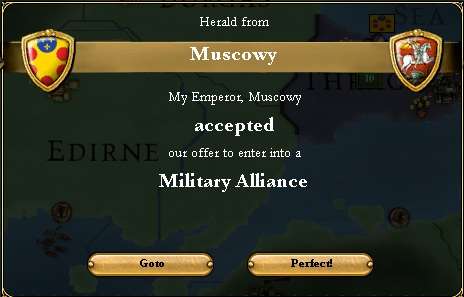
Muscovy was a powerful friend. There was virtually no conflict of interest between the two Empires; only the Ottoman lands bordering Muscovy, and Emperor John was perfectly willing to let Muscovy have those. The former Byzantine Empire had included Crimea; John I could care less. More importantly, Muscovy was huge, had a mighty army, and deep coffers. They might even help against Austria, if all else worked properly.
Emperor John I quickly signed the alliance, and sent it to the Senate for ratification, but already signed. This put the Senate in an uncomfortable position; either they signed it, and sanctioned his foreign policy powers, or they didn't, and made the Emperor look as if he would break his word, and thus maybe even result in war with Muscovy. Three Senators voted yes with no hesitation; Prince Leopoldo, Theologian von Brecht, and Tiberius Graecus, Duke of Constantinople. No real opposition was organized -- even Andreas Germanicus thought it was a great idea -- but Gathenhielm, in particular, was worried. The Emperor had gained a powerful area of influence with little or no Senate opposition.
What could this mean for the future?
--------------------------------------------------------------------------------------------------
It took me a lot longer to work this out than I thought, but I'm pretty pleased with how it turned out. I think I've created plenty of foreshadowing for the future! There will be one update with John I; I'm purposefully not playing any farther than that.
Questions, comments, and concerns are always appreciated. Next update should be this weekend. Until then, enjoy!




